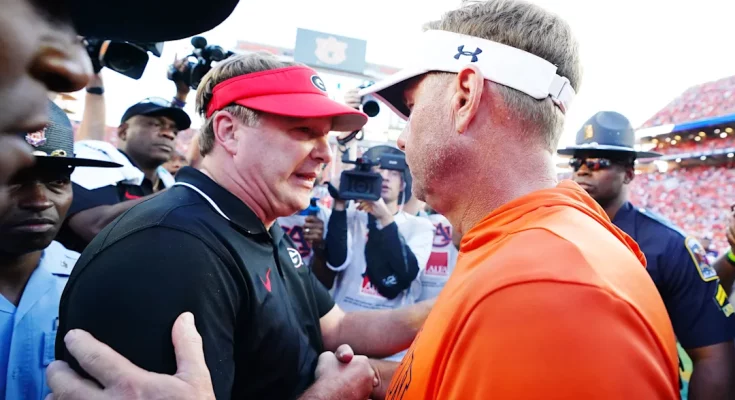The 2025 college football season is already shaping up to be one of the most unpredictable and electric in recent memory, and among the boldest predictions making waves in SEC country is this: the Georgia Bulldogs, a powerhouse program that has terrorized the Southeastern Conference for the better part of a decade, are projected to suffer their first loss of the season to none other than the Auburn Tigers. While Georgia enters the fall once again armed with elite talent, championship pedigree, and the swagger that comes with recent national dominance, several analysts and insiders have pointed to Auburn as the team most likely to crack the code early and knock off the Bulldogs. This isn’t just blind optimism from the Plains—it’s a calculated projection based on timing, momentum, matchups, and renewed energy emanating from Auburn’s rejuvenated program under Hugh Freeze.
Georgia’s reputation precedes them. Kirby Smart’s team continues to function as a near-flawless machine, expertly recruiting five-star talent across both sides of the ball while developing it into NFL-ready skill. They’ve built one of the most complete and consistent rosters in modern college football history. In 2025, that reality remains largely unchanged. Quarterback Gunner Stockton is expected to take another leap, the Bulldogs are returning a deep rotation of skill players on offense, and the defensive front remains stout and suffocating. With Smart’s fingerprints on every aspect of the program and a culture that emphasizes relentless preparation and execution, Georgia once again starts the season as a top-two team in every meaningful poll.
But college football is built on chaos and emotion. And emotion is something Auburn has in abundance. The Tigers, once regarded as a flailing SEC team in desperate need of identity, now find themselves rising in confidence, talent, and belief. Hugh Freeze, in just his second full season at the helm, has transformed the culture in the locker room and on the recruiting trail. After landing several key transfers and blue-chip freshmen, the Tigers look like a program ready to make noise, not just compete. That optimism has spilled into Jordan-Hare Stadium, where fans are starting to believe that not only is a winning season possible—but that a major upset over Georgia could be the defining moment that truly signals a return to SEC prominence.
Why Auburn, and why now? Timing plays a massive role in how college football seasons unfold. Georgia is expected to enter the game at 4-0, with impressive but not necessarily challenging wins over early non-conference opponents and a shaky start to conference play. The Bulldogs could be coming off a tough, physical game against a strong defensive front—possibly Ole Miss or South Carolina—which could leave their offensive line bruised and their rhythm slightly disrupted. Auburn, on the other hand, is projected to build steam through the early portion of their schedule, including confidence-boosting wins and improved chemistry across the offensive unit. With Cam Coleman breaking out as one of the SEC’s premier receiving threats and a backfield led by seasoned rushers, Auburn’s offense could be humming by the time the Bulldogs visit the Plains.
Then there’s the location—Jordan-Hare Stadium, perhaps the most chaotic venue in college football when an underdog has belief. The lore of the stadium is well-known: inexplicable plays, massive upsets, and the kind of magic that’s hard to quantify but impossible to ignore. Ask Alabama about the Kick Six. Ask Georgia themselves, who’ve seen Auburn take them down in 2017 when Georgia was ranked No. 1. Playing at Jordan-Hare when the Tigers are rolling is a different animal altogether. The crowd noise, the emotion, the sheer momentum created by the energy in the stands can swing the outcome of games, especially against elite teams that aren’t used to getting punched in the mouth.
The matchups also favor Auburn more than some might expect. Georgia’s defensive line is elite, but they may not be as deep or experienced in 2025 as in past seasons. Auburn’s offensive line, bolstered by transfer additions and a second year under Freeze’s system, is expected to be more physical and better coordinated. This means Auburn could win battles in the trenches, particularly in the run game, setting up favorable down-and-distance situations and keeping Georgia’s vaunted pass rush at bay. With tempo and creativity in playcalling, Freeze could isolate mismatches in Georgia’s secondary, especially if Cam Coleman continues to emerge as an elite outside threat.
On defense, Auburn’s greatest improvement may come in the linebacker and safety groups. Last year, their Achilles’ heel was giving up big plays over the middle, but with a revamped group of fast, instinctive defenders and more confidence in zone coverage, Auburn can match up with Georgia’s tight end-heavy formations better than most. If Auburn can contain the run and force Georgia into third-and-long situations, their aggressive front four—led by pass rushers who’ve already flashed NFL potential—could force Stockton into uncomfortable positions. Georgia’s young offensive line may be tested in a way it hasn’t experienced yet, particularly if the crowd noise causes communication issues.
But beyond matchups, personnel, and coaching, there’s an intangible quality to this prediction—momentum. College football often swings on momentum. One big play, one turnover, one shift in emotion can flip the course of a season. Auburn has been thirsting for a signature win to validate the progress under Freeze, and the Georgia game presents that golden opportunity. If Auburn enters that game with belief, health, and swagger, they could dictate the emotional pace of the game. A couple of early stops, a turnover, a deep shot to Coleman, and the energy inside Jordan-Hare could tilt the scales in favor of the underdog. Freeze has shown in previous tenures—at Ole Miss especially—that he knows how to prepare a team emotionally and tactically for big games, particularly against more heralded opponents.



